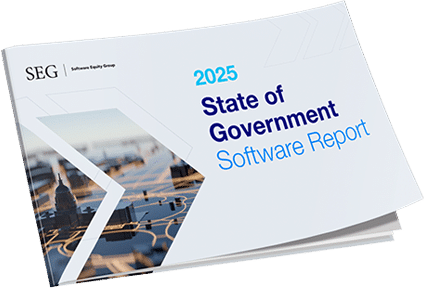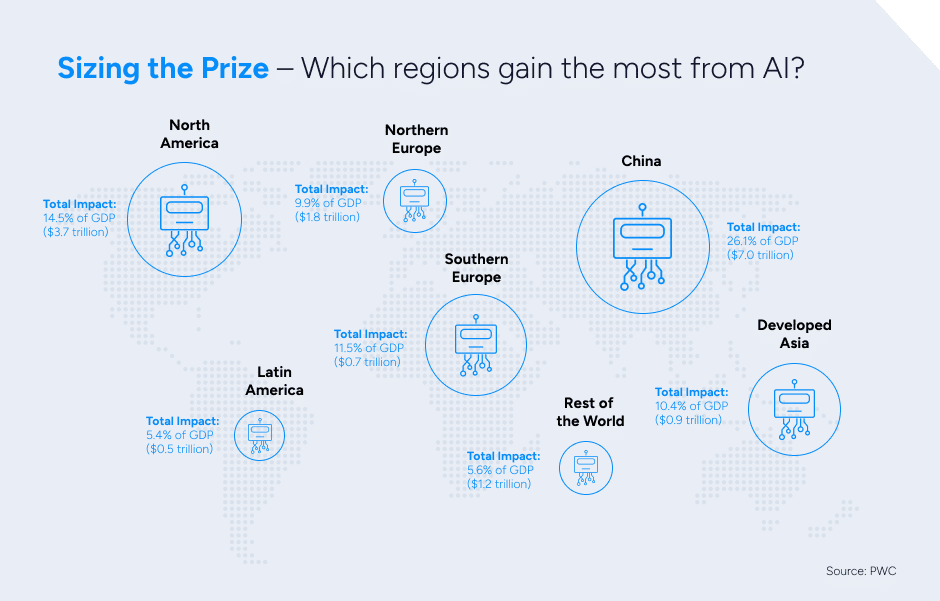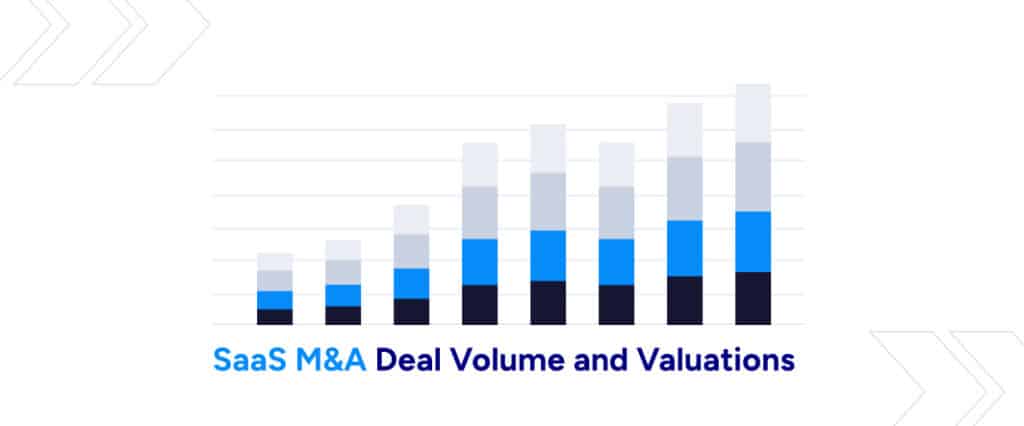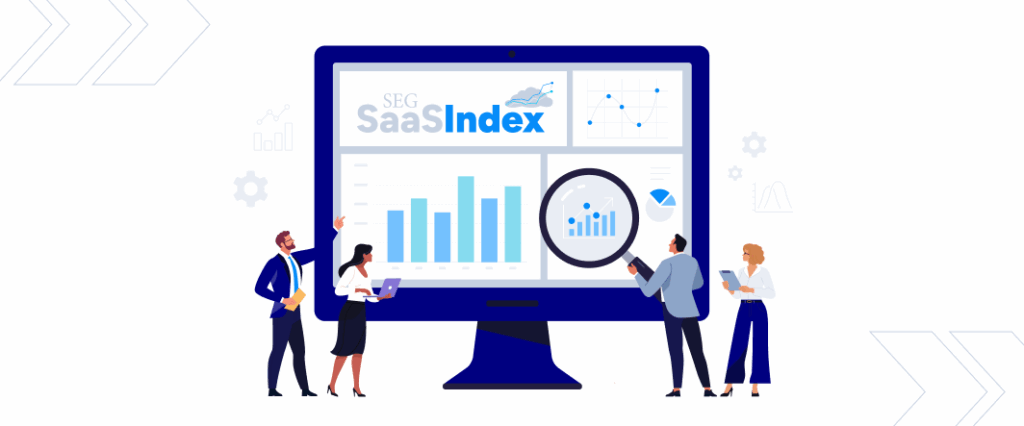How SaaS and AI are Building the Future of Intelligent Software
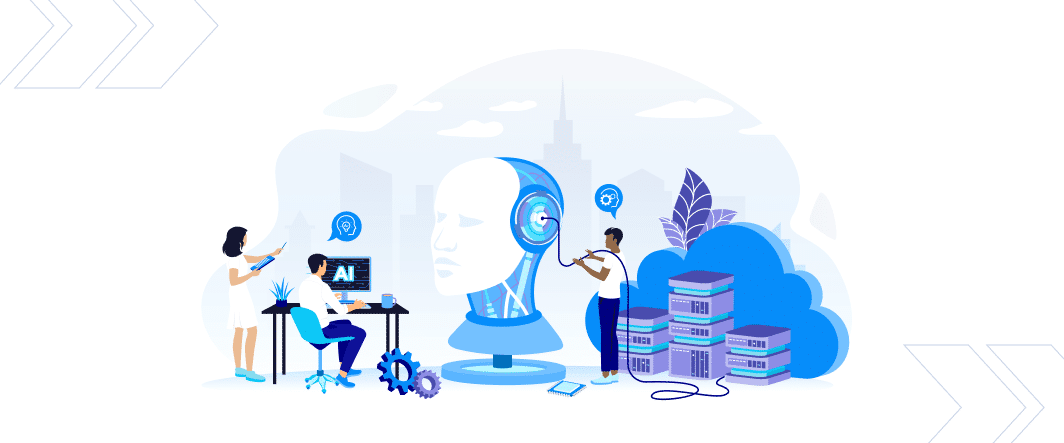
Today, two terms have fundamentally altered our approach to business and innovation: SaaS (Software as a Service) and AI (Artificial Intelligence). For those steering the SaaS industry ship, understanding these concepts individually is crucial. Yet, grasping the transformative synergy they create together is essential for staying ahead of the curve. The fusion of AI into SaaS represents not merely a trend but a seismic shift destined to redefine the sector, opening new avenues for growth, efficiency, and innovation. But, as with any significant change, it introduces a set of challenges and responsibilities. For SaaS leaders, mastering the intricacies of AI’s role in SaaS is no longer a luxury—it’s a prerequisite for competitive survival and future success.
This blog post discusses the critical importance of AI within the SaaS space. We’ll navigate through the basics, examine how AI enhances SaaS offerings, provide detailed case studies, and discuss emerging trends shaping the future.
Understanding SaaS and AI
What is SaaS? In simple terms, SaaS is a model where software is accessed online via a subscription rather than installed on personal devices. This approach allows for hassle-free access through the web, offering scalability and flexibility unparalleled by traditional software models. A significant appeal of SaaS is its recurring revenue model, which makes it particularly attractive to investors due to the predictable and ongoing income stream it offers.
And AI? AI equips machines with capabilities that mimic human intelligence. AI systems can learn from data, reason through problems, and even self-correct their course of action. This allows machines to tackle tasks that traditionally require human intelligence, such as understanding natural language and identifying patterns in complex data sets. From image recognition software and predictive pattern recognition to chatbots that answer your questions, AI is transforming many aspects of our lives.
Where They Meet: The true magic happens at the intersection of SaaS and AI. AI’s ability to process and learn from vast data enhances SaaS applications, making them smarter and more adaptable. This integration means SaaS products can offer personalized experiences, automate mundane tasks, and unearth insights that were previously out of reach.
The Impact of AI on the SaaS Industry
AI’s influence on the SaaS landscape is profound and far-reaching. It has revolutionized software solutions, making them more intelligent, efficient, and customized. Here’s how:
- Personalization: AI’s ability to digest user data and tailor experiences accordingly has set new standards for user engagement and satisfaction.
- Automation: By taking over routine tasks, AI has freed up human creativity for more complex challenges, enhancing operational efficiency.
- Predictive Analytics: The predictive prowess of AI, powered by its analysis of extensive data sets, helps businesses anticipate needs and make informed decisions.
- Customer Support: AI-driven support tools like chatbots have transformed customer service, offering instant assistance without the constraints of human availability.
- Security: In an age of cyber threats, AI’s pattern recognition capabilities are crucial for detecting and neutralizing potential security breaches.
Given Ascendix’s report, the surge from 72,000 to over 175,000 SaaS companies, when including AI-focused firms, underscores AI’s pivotal role in shaping the future of SaaS.
Real-world AI Applications in SaaS
The practical use of AI within SaaS spans various innovative applications:
- Conversational AI is redefining customer interaction with intelligent chatbots and virtual assistants.
- Generative AI creates personalized content, enhancing marketing efforts and customer engagement.
- Predictive Analytics employs AI to forecast trends, enabling smarter business strategies.
- Computer Vision and Machine Learning Platforms are revolutionizing fields by teaching computers to “see” and automate learning, respectively.
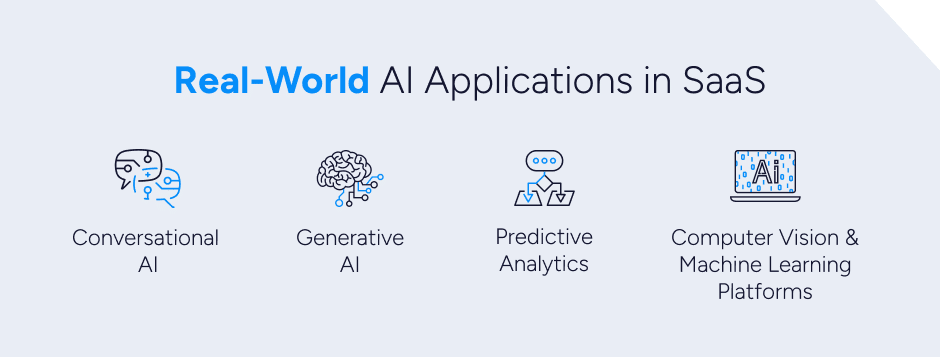
Embracing AI Across the SaaS Industry
Adoption rates of AI in SaaS are telling of its significance, with studies showing a majority of SaaS vendors incorporating or developing AI/ML capabilities. This wide adoption across marketing, customer service, healthcare, and education not only illustrates AI’s versatility but also its transformative potential across industries.
These examples underscore AI’s integral role in delivering tailored, efficient SaaS solutions. Let’s explore how some companies are harnessing AI within their SaaS offerings:
- HubSpot: Utilizes conversational AI through its ChatSpot.ai tool, enhancing customer interaction. Its content assistant tool, powered by generative AI and NLP, aids in content creation for marketing and sales.
- Grammarly: Employs generative AI and NLP to improve writing by suggesting grammatical corrections and generating text, showcasing the potential of AI in enhancing communication tools.
- Adobe: Leverages generative AI in Adobe Sensei to optimize user experiences across its suite of tools, from content generation to recommendation algorithms.
- ELSA: Uses conversational AI and NLP in its language learning platform, providing interactive lessons and real-time feedback, exemplifying AI’s role in educational technology.
- EdApp: Implements generative AI for its AI Create feature, streamlining the process of generating course content and questions, highlighting efficiency in e-learning.
- Siemens: Applies machine learning and predictive analytics in its industrial applications to optimize processes, alongside explorations in generative AI for industrial AI use cases.
These instances demonstrate the diverse applications of AI in SaaS, enhancing everything from customer service to learning processes and industrial operations.
Why Buyers and Investors Embrace AI
Buyers and investors are particularly attracted to AI within SaaS due to its potential to significantly enhance scalability, efficiency, and profitability. AI’s ability to provide deep insights and predictive analytics allows businesses to make more informed, data-driven decisions that are crucial for maintaining a competitive edge. Additionally, the integration of AI helps automate complex processes, reduce costs, and improve customer experiences, which are key factors in driving business growth and attracting investment.
A few examples of buyer and investor interest in AI are listed below:
Private Equity Investments in AI:
Silver Lake, in partnership with Canada Pension Plan Investment Board (CPP), acquired Qualtrics International for $12.25B (8.8x EV/TTM Revenue). Qualtrics is a provider of AI-based experience management SaaS and represents Silver Lake’s largest deal to date. “We’re thrilled to support the continued efficient growth of Qualtrics into a generational, highly profitable platform company by enabling further investment across all aspects of the business, including areas such as AI and other powerful new technologies.” Read Press Release
Insight Partners & Clearlake Capital acquired Alteryx, a provider of generative AI-based analytics software, for $3.46B. “We are thrilled to support Alteryx as it continues to push the industry forward with generative AI and machine learning SaaS technologies, as well as its growing portfolio of cloud-connected offerings.” Read Press Release
Vista Equity Partners acquired Model N, a provider of cloud and AI-based revenue optimization and compliance management software, for $1.18B. “The need for revenue optimization and compliance solutions that deliver comprehensive visibility and control is greater than ever. As a private company under Vista’s ownership, we will have the added resources to navigate this dynamic market and drive ARR growth for the long term.” Read Press Release
Thoma Bravo acquired Magnet Forensics, a provider of AI-based digital investigation SaaS and related APIs to businesses and law enforcement and services agencies globally, for $1.23B. “We look forward to bringing together the complementary capabilities of Magnet and Grayshift to create a leader in the digital forensics and cyber security space. Digital evidence is an increasingly critical aspect of investigations, and the combined company will be well-positioned to further market expansion, accelerate innovation, and provide even greater solutions to its customers.” Read Press Release
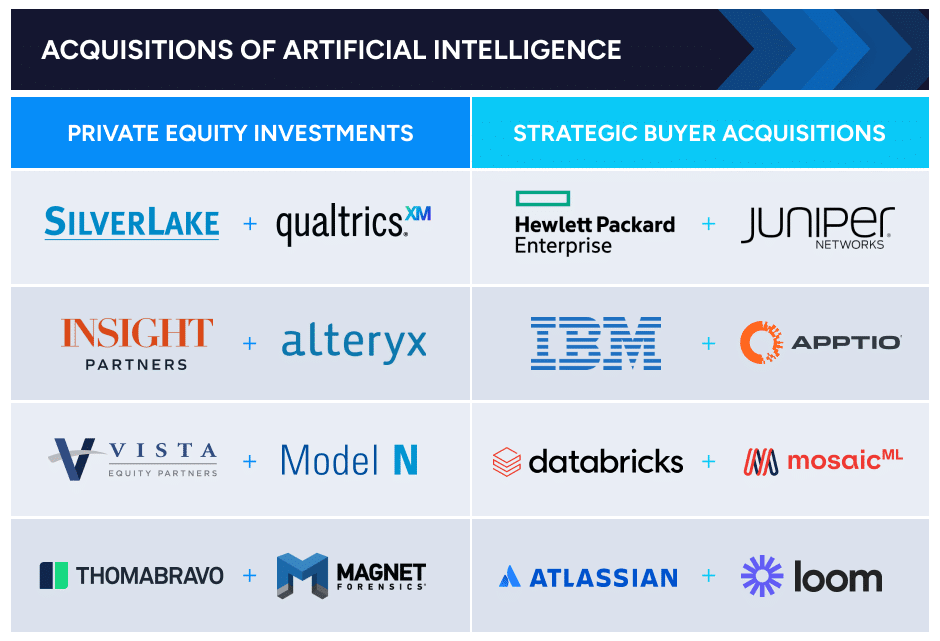
Strategic Buyer Acquisitions of AI:
Hewlett Packard Enterprise Company acquired Juniper Networks, a provider of AI-based cloud-native networking management software and systems, for $12.8B. The transaction represents HP’s first 11-figure purchase and will “strengthen HPE’s position at the nexus of accelerating macro-AI trends, expand our total addressable market, and drive further innovation for customers as we help bridge the AI-native and cloud-native worlds.” Read Press Release
IBM Acquired Apptio, a provider of AI-based IT business management and ERP SaaS, for $4.6B. This continues IBM’s desire to capitalize on the hype and market potential surrounding the usage of AI in operations (AIOps). “Apptio’s offerings, combined with IBM’s IT automation software and Watsonx AI platform, gives clients the most comprehensive approach to optimize and manage all of their technology investments.” Read Press Release
Databricks acquired MosaicML, a provider of machine learning and generative AI model development SaaS, for $1.3B. This represents Databrick’s largest acquisition to date and strengthens its custom AI model development position. “Databricks and MosaicML have an incredible opportunity to democratize AI and make the Lakehouse the best place to build generative AI and LLMs.” Read Press Release
Atlassian acquired Loom, an AI-driven and video-based work communication SaaS, for $975M. The acquisition will enhance Atlassian’s product portfolio with asynchronous video collaboration capabilities that are “the next evolution of team collaboration” and will help “distributed teams communicate in deeply human ways.” Read Press Release
These are only a few examples of many AI-powered businesses taking shape in today’s technology M&A landscape. And, according to 451 M&A Knowledgebase, Generative AI is anticipated to be a significant driver of spending within the IT sector throughout 2024.
The Future of AI in SaaS
Looking ahead, the trajectory for AI in SaaS points to even more personalized services, increased automation, and sophisticated predictive analytics. Yet, this future is not without its challenges, including data privacy concerns and the complexities of managing increasingly intricate AI algorithms. Nonetheless, the opportunities for enhancing user experiences, streamlining operations, and gaining competitive advantages are immense.
The integration of AI into SaaS heralds a new era of intelligent software solutions. For today’s SaaS leaders, staying informed and agile in the face of these advancements is crucial for steering their companies toward enduring success in an AI-driven world.
Economic Impact of AI
AI could contribute up to $15.7 trillion to the global economy by 2030, enhancing sectors from healthcare to finance with innovations that drive efficiency and economic growth. The monetization of AI technologies through products and services that improve business operations and consumer experiences plays a pivotal role in this economic impact.
The evolution of AI in the SaaS domain is not just a fleeting trend but a cornerstone of modern software innovation. As AI continues to evolve, its integration with SaaS will only deepen, creating more robust, efficient, and user-centric solutions that could redefine what is possible in the digital age.
Navigating M&A in SaaS AI
Navigating this rapidly advancing landscape presents unique challenges and opportunities for SaaS companies. As a sell-side M&A firm specializing in the software sector, we are positioned to help companies understand their strategic value in a market that highly prizes innovative AI integrations within SaaS. Our expert team provides bespoke advisory services that prepare software companies for successful M&A, optimizing their position in an increasingly AI-driven marketplace. We support your strategic decisions with comprehensive market insights and a robust network of technology-focused investors.
For SaaS leaders looking to capitalize on the opportunities AI presents, aligning with knowledgeable partners can illuminate pathways not just for growth but also for potential exits. If you are considering strategic options for your SaaS company, connect with us to explore how you can enhance your company’s value in the eyes of investors and position yourself favorably in a dynamic market.

